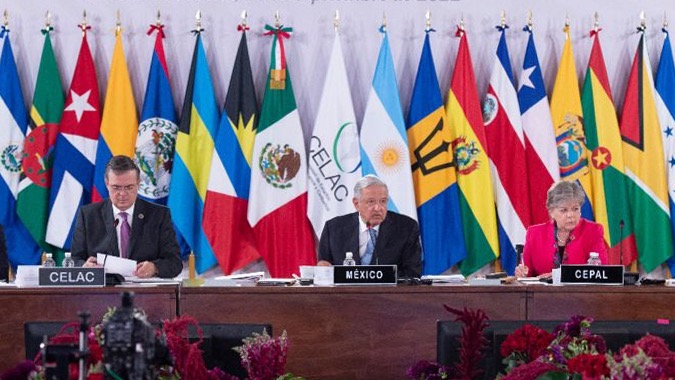As Western nations rallied behind sanctions on Russia and arms support for Ukraine, a strikingly different approach emerged across Latin America.
This divergence finds roots in the region’s history, scarred by past American interventions in nations like Cuba and Mexico.
Latin America isn’t just a bystander—it’s actively seeking an end to the conflict. Brazil, a heavyweight in the region and part of the non-Western BRICS bloc, boldly steps up, offering mediation between Russia and Ukraine.
Join us on Telegram: https://t.me/tfiglobal
This region embodies a defiantly “Global South” stance—neither cozying up to the West nor tilting toward Russia in the Ukrainian conflict.
But as the West persistently prods nations to toe its line, whether in steadfastly backing Ukraine or cutting off ties with Russia through sanctions, it tried the same tactics with Latin America. Did the region give in? Not a chance. Latin America stood its ground, shrugging off the West’s pressure game.
The EU relentlessly pushed proposals for aiding Ukraine in Latin America’s direction. Despite the persistent attempts, Latin America stood firm, refusing to yield to the EU’s demands. In every West-Latin America summit addressing the Ukraine issue, a consistent thread prevailed.
The echoes of colonial history reverberated, haunting Latin American leaders throughout their summit.
Read More: How Russia, China and India conquered America’s backyard
For the guests, the weight of four centuries under European colonial rule, economic exploitation, and slavery loomed large. Meanwhile, for the hosts, the immediacy of Russia’s war on Ukraine took center stage.
Such starkly different perspectives made it challenging for both sides to find common ground during the summits, especially in crafting a unified statement condemning Russia’s aggressive actions.
This persistent divergence has consistently frustrated the West, as EU leaders faced an uphill battle in persuading the Community of Latin American and Caribbean States (CELAC), just as they did this time around.
In a recent twist, leaders from 33 nations of the Community of Latin American and Caribbean States (CELAC) are gearing up for a summit in Brussels on July 17-18, meeting their EU counterparts.
The EU’s proposed summit declaration stirred the pot by including hefty paragraphs in support of Ukraine, raising the hackles of Latin American countries. And guess what? Once again, the region poured cold water on the West’s aspirations.
These nations fired back with a robust 21-page counter-proposal to the EU’s draft text, completely scrubbing any mention of Ukraine—an act that didn’t sit well with EU diplomats, to say the least.
It’s crystal clear: Latin America isn’t keen on rallying behind Ukraine. But here’s the twist—the CELAC members veered into unexpected territory by calling on Europeans to reckon with reparations for the damages caused by slavery, igniting what could be a highly contentious issue on the horizon.
“We recognize that appropriate measures must be taken to restore the dignity of the victims, of the transatlantic slave trade with people from Africa. This includes reparations and compensation that will help heal our collective memory and eliminate the legacies of underdevelopment,” the proposed draft statement said.
In this context, the draft takes particular account of “aspects of health care, education, cultural development and food security.”
“We acknowledge and deeply regret the immeasurable suffering inflicted on millions of men, women and children by the transatlantic slave trade of people from Africa,” it says.
Ever since Russia launched its assault on Ukraine, European pressure has been unrelenting, urging Latin America to align with the West in supporting Ukraine. Yet again, as European leaders aimed to defuse geopolitical tensions, their Latin American counterparts delivered a clear message: Today’s relations are inseparable from addressing historical injustices—particularly as the EU eyes the resource-rich region to drive its green transition.
For many in Latin America, much like their Global South counterparts, the Ukraine conflict evokes memories of a looming new Cold War. The region’s history bears scars from the Cold War era, marked by numerous US-backed right-wing coups. Socialist governments aligned with the Soviet-led communist bloc faced outright rejection from Washington.
Read More: BRICS Expansion: Implications for Global Economic Balance
For Latin American nations, alliances like BRICS hold greater appeal. Argentina recently joined BRICS as part of an expansion strategy alongside Saudi Arabia and the UAE.
Latin America has consistently viewed Russia as “much more important.” Therefore, the EU’s attempt to sway the region is akin to supporting the wrong contender. Asking Latin America to pick sides won’t fly—it’s a region that won’t easily forget the atrocities inflicted upon it by the West.
The EU’s expectation for Latin America to align against Russia may not align with the region’s historical ties and perceived significance. Latin America’s stance hints at a deep-rooted skepticism and a strong reluctance to heed the EU’s call.
Recommended Video:
